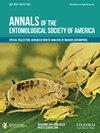一个缺乏内含子的HSP90基因在辣椒茧蜂中的发育和温度诱导表达(膜翅目:茧蜂科)
IF 1.8
3区 农林科学
Q1 ENTOMOLOGY
引用次数: 0
摘要
摘要Chilonia(Munakata)是我国水稻主要害虫二化螟(鳞翅目:梨目)的主要寄生蜂。随着气候变化的持续加剧,辣椒和二化螟必须适应日益频繁的不利温度。本研究从C.chilonis中分离并鉴定了新的Cchhsp90-2。Cchhsp90-2 cDNA全长2689bp,编码728个氨基酸,等电点为4.93。Ccsp90-2编码三个热休克蛋白90(HSP90)家族特征,基因组和cDNA序列比对表明Ccsp90-2不含内含子。实时定量PCR显示Cchhsp90-2在卵和成虫中均有诱导作用;幼虫和蛹Cchhsp90-2的表达水平没有显著差异。Cchhsp90-2在高温和低温下都被诱导,在33°C或-13°C下暴露2小时后具有非常高的表达水平。这项研究深入了解了chilonis耐热性的机制基础,并对部署这种黄蜂来控制二化螟具有启示意义。本文章由计算机程序翻译,如有差异,请以英文原文为准。
Development and Temperature-induced Expression of a HSP90 Gene Lacking Introns in Cotesia chilonis (Hymenoptera: Braconidae)
Abstract Cotesia chilonis (Munakata) is the predominant parasitic wasp of Chilo suppressalis Walker (Lepidoptera: Pyralidea), a major rice pest in China. As climate change continues to intensify, C. chilonis and C. suppressalis must adapt to the increased frequency of adverse temperatures. In this study, the novel Cchsp90-2 was isolated and characterized from C. chilonis. The full-length Cchsp90-2 cDNA was 2689 bp and encoded 728 amino acids with an isoelectric point of 4.93. Cchsp90-2 encodes three heat shock protein 90 (HSP90) family signatures, and the alignment of genomic and cDNA sequences revealed that Cchsp90-2 does not contain introns. Real-time quantitative PCR revealed that Cchsp90-2 was induced in eggs and adults; however, larvae and pupae showed no significant differences in Cchsp90-2 expression levels. Cchsp90-2 was induced at both high and low temperatures, with very high expression levels after a 2-h exposure to 33°C or –13°C. This study provides insight into the mechanistic basis of thermal tolerance in C. chilonis and has implications for deploying this wasp to control C. suppressalis.
求助全文
通过发布文献求助,成功后即可免费获取论文全文。
去求助
来源期刊
CiteScore
4.90
自引率
0.00%
发文量
25
审稿时长
6-12 weeks
期刊介绍:
The Annals of the Entomological Society of America exists to stimulate interdisciplinary dialogue across the entomological disciplines and to advance cooperative interaction among diverse groups of entomologists. It seeks to attract and publish cutting-edge research, reviews, collections of articles on a common topic of broad interest, and discussion of topics with national or international importance. We especially welcome articles covering developing areas of research, controversial issues or debate, and topics of importance to society. Manuscripts that are primarily reports of new species, methodology, pest management, or the biology of single species generally will be referred to other journals of the ESA. The most important criteria for acceptance are quality of work and breadth of interest to the readership.

 求助内容:
求助内容: 应助结果提醒方式:
应助结果提醒方式:


